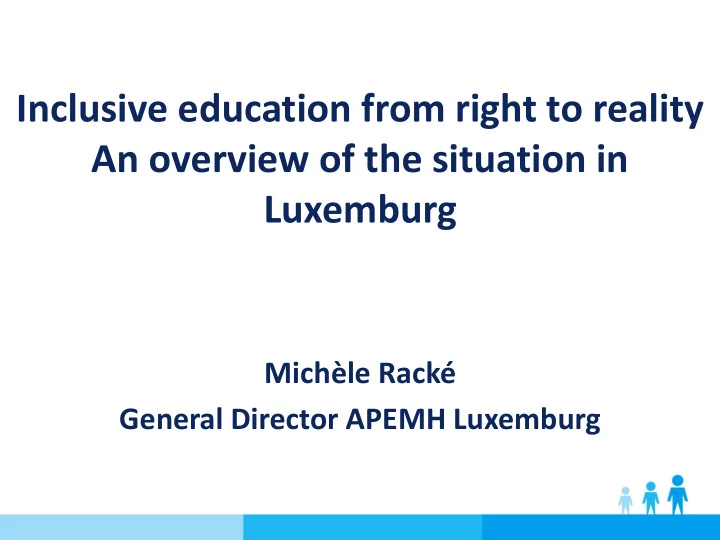

Inclusive education from right to reality An overview of the situation in Luxemburg Michèle Racké General Director APEMH Luxemburg
APEMH – who we are? Created in 1967 by a group of concerned parents, APEMH has been active for 50 years in the field of support for people with intellectual disabilities and their families.
APEMH activities respond to two objectives: defending the rights and interests of people with intellectual disabilities; managing various structures and services, offers covering the whole life-span.
Structures and services • Inclusive childcare services • Homecare assistance • Family-support services • Day-care structures • Residental facilities • Vocational training structures and workplaces (sheltered workshops) • Innovative skills centers for professionals
Inclusive education in Luxemburg Formal education Non formal education School setting Child care services Ministry for Education, Until 2012: Ministry for Children and Youth family affairs and integration Since 2013: Ministry for Education, Children and Youth
Overview of school laws • 1912 : exclusion of children with disabilities from school • 1973 : school obligation for all children → right for children with special needs to get school education → development of special schools • 1994: law concerning school integration → right to access mainstream schools
• 1998: support service for children with disabilities in mainstream schools (SREA) • 2017 : law concerning school organisation • 2018 : law concerning implementation of national competence centers for special needs education → promote inclusion in mainstream schools
One school for all! Three-tiered approach for children with special educational needs: At a local level At a regional level At a national level
Local level Support given by: Regular teachers Special education teachers
Regional level Support given by: Regional school director Special support service School commission for inclusion
National level Support given by: 8 special competence centers, offering : A school unit A diagnostic unit and counselling A reeducation and therapy unit
Social emotional development Speech Motor development development Visual High potential development Intellectual Autism development Learning development
Development in the non formal education sector • Until 2010 : – Child care services for children from 0-4 years – Very few services for children in school age • New political orientation : – Conciliation family life – working life → development of services for children from 4-12 years
• Support to promote inclusion of children with special needs: financial resources to recruit additional staff when a child with special needs is attending the service • 2012 Paradigm shift : funding of projects to support professionals in implementing an inclusive approach • 2013 : Transfer to Ministry for Education, Children and Youth
• 2017 : National Framework for non-formal education → Inclusion: one of the fundamental principles of this framework → Willingness to change the system by reorganizing funds for inclusive pedagogy → Need to support child care services to develop an inclusive pedagogy to accommodate all children
Contribution of the APEMH in the non formal education sector Fundamental questions: • How do we develop and promote inclusion in child care services? • Multiply offers or be multiplier?
1. Step: Training offer • Training: "Oser la diversité - Dare the richness“ • 6-days training for professionals • Sensibilisation of the sector • UFEP • 2011-2014
2. Step: Documentation • Documentation and analysis of the inclusive practices of the child care service TOPOLINO • Best practice • 8 Recommandations • 2011-2012
3. Step: Implementation of a Resource Center in 2012 • Educational and training resource center for inclusion • A support to promote and develop inclusive child care services • Goal: encourage the development of inclusive approaches and practices to increase the number of child care services implementing such an approach
Objectives
Service Offers • Trainings / workshops for childcare workers / In-house trainings / coaching • Consultancies to help the settings explore any elements of inclusion they choose • Supporting the setting to identify how best to meet the child’s particular requirements for accessing the group
• Evaluation and reflection of particular situations by structured observation of the children in the child care service • Activities to raise the awareness of the peers • Regional network, platforms for professional exchange concerning topics related to inclusive practices
2015 • Publication “Child care services for all”, in collaboration with the Ministry for Education, Children and Youth and the National Youth Service • For professionals working in the non-formal education system • Content: Theoretical part Guidelines for the implementation of an inclusive approach Testimonials of concrete experiences from the field
2017 • Incluso as expert for the ministry in inclusion working group • National guidelines for inclusive child care service • Strengthening of the service Incluso: position as national competence center • Actor in the training of « counselling tutors for inclusion »
Comparison Formal education Non formal education Support focussed on Support focussed on the child the professional / the service Coexistance of Almost no special mainstream and special schools services offered Top down Bottom up and then top implementation down implementation
Challenges and successes Formal education Non formal education Decreasing number of Increasing number of children with special children with special needs in mainstream needs in child care schools services Transformation of Opening and welcoming existing structures: from of existing structures for special schools to children with special competence centers needs
Common challenge
Recommend
More recommend